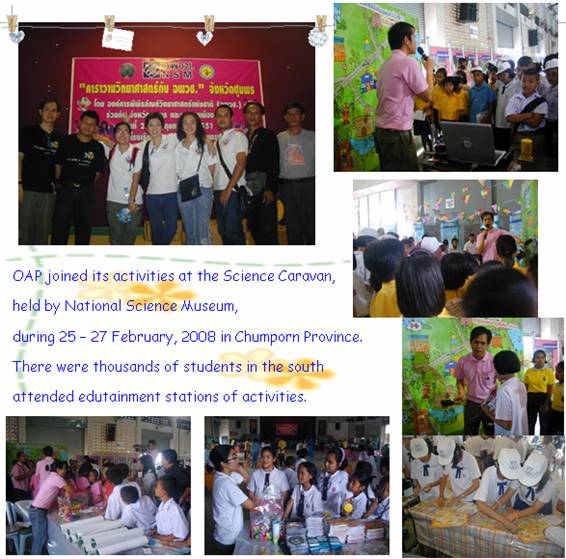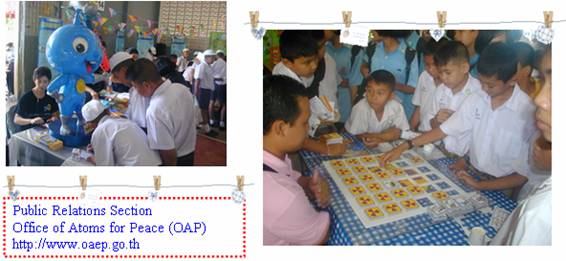Survey Results of Office of Atoms for Peace
on
The opinions of Thai people toward "Nuclear Energy"
during September - October 2007
(Proceeded by Suan Dusit Poll)
The Office of Atoms for Peace hired Suan Dusit Poll, Rajabhat Suan Dusit University, to perform a survey on the opinion of Thai people toward "Nuclear Energy" during September - October 2007. The 6,117 samples were selected from all over Thailand representing central, eastern, western, northern, north-eastern, southern part and Bangkok. The majority of the group surveyed were female (62.68 %).
The following are results of the survey:
1. Personal information of the samples:
1.1 Age: 43.68 % were between 21-30 years old.
21.22 % were between 31-40 years old.
15.04 % were between 41-50 years old.
1.2 Education: 44.97 % were graduated Bachelor Degree.
43.17 % were lower than Bachelor Degree.
7.77 % were higher than Bachelor Degree.
1.3 Occupation: 26.47 % were employees of private companies.
25.98 % were government officials.
18.10 % were students.
2. Nuclear Energy:
2.1 When talking about "Nuclear Energy":
26.68 % of the samples thought about nuclear bomb, nuclear weapon and nuclear missile.
12.79 % of the samples thought about disaster, extermination and powerful explosion.
10.93 % of the samples thought about Nuclear Power Plant.
2.2 The opinion toward "Nuclear Energy:
44.14 % were afraid of nuclear energy.
43.03 % had no opinion.
12.83 % were not afraid of nuclear energy.
2.3 The importance of "Nuclear Energy" for country development:
39.59 % thought that nuclear energy is very important for country development.
34.67 % thought that nuclear energy is of medium important for country development.
10.69 % thought that nuclear energy is the most important for country development.
3. Awareness of "Nuclear Energy":
Most samples were aware that nuclear energy was utilized in various fields in many countries around the world.
Some samples were aware that utilization of nuclear energy in Thailand is under regulations of the Office of Atoms for Peace.
Some samples were aware of the utilization of nuclear energy for electricity generating.
Some samples were aware of the utilization of nuclear energy in industry.
Some samples were aware of the utilization of nuclear energy for cancer treatment and medical field.
Quite a number of samples were uncertain about the utilization of nuclear energy to prolong shelf-life of food and agriculture products.
Quite a number of samples believed that nuclear energy was not natural.
In general, 78.33 % of the samples received the correct information about nuclear energy.
4. Nuclear energy information and media:
4.1 The samples received information about nuclear energy through newspapers and television more than once a month but not from any other means.
4.2 Information about nuclear energy during 2007 compared with 2006:
43.83 % of samples felt that there was no difference.
27.86 % felt that there was more information about nuclear energy during 2007 compared with 2006.
26.24 % felt that there was less information about nuclear energy during 2007 compared with 2006.
4.3 Dissemination channel:
26.91 % preferred to get information through television.
15.02 % preferred to get information through newspapers.
10.96 % preferred to get information through radio.
4.4 Needs of information:
31.03 % wanted to know about the advantage and disadvantage of nuclear energy.
15.21 % wanted to know about the effect of nuclear energy to human and living organism and the environmental impact.
11.86 % wanted to know about the useful applications of nuclear energy.
4.5 It was suggested that the dissemination of public information should be more intensive with emphasizing on the advantage and disadvantage of nuclear energy, safety and security measures, rules and regulations to ensure safe utilization of nuclear energy.
5. Nuclear Power Plant (NPP):
5.1 Need of NPP in Thailand:
39.81 % were uncertain about the need of NPP in Thailand because they were lack of information about good and bad points of NPP and the competence of the regulatory authority. They wanted to hear the decision of the majority before judging.
30.98 % thought that Thailand was in need of NPP as an energy option and to ensure stability of economy in the long run.
26.12 % were against NPP. They believed that NPP was dangerous and very harmful to lives and environment. They thought that NPP could cause global warming.
5.2 Advantage VS Disadvantage of NPP:
29.79 % could not make decision.
26.34 % thought that the advantage and disadvantage of NPP were equal.
24.82 % thought that NPP had more disadvantage.
13.34 % thought that NPP had more advantage.
5.3 The samples were concerned about danger from NPP, environmental impact and the impact to lives and public in respective order.
5.4 The most needed information about NPP were the danger of NPP, the advantage and disadvantage of NPP, and radiation protection, respectively.
5.5 Suggestion from the samples:
- More information about the needs of NPP and the benefit to public should be intensively disseminated.
- The public must be ensured of the safety operation of NPP, the security system including safety and security measures and regulations.
- Studies should be done carefully before making any decision.


|